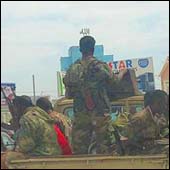 Last Friday, there were news reports, like this one in the BBC, that the Twitter account of Somali terrorist group Al-Shabaab, had been suspended by Twitter. Apparently, some of its more outrageous tweets violated the Twitter terms of service. Of course, my first thought ran along these lines: how did Al-Shabaab, which is listed on the Office of Foreign Assets Control’s List of Specially Designated Entities and Blocked Persons as a Specially Designated Global Terrorist (“SDGT”) get a Twitter account in the first place? And why are they just now getting booted off the service?
Last Friday, there were news reports, like this one in the BBC, that the Twitter account of Somali terrorist group Al-Shabaab, had been suspended by Twitter. Apparently, some of its more outrageous tweets violated the Twitter terms of service. Of course, my first thought ran along these lines: how did Al-Shabaab, which is listed on the Office of Foreign Assets Control’s List of Specially Designated Entities and Blocked Persons as a Specially Designated Global Terrorist (“SDGT”) get a Twitter account in the first place? And why are they just now getting booted off the service?
One of the sections of the regulations under which Al-Shabaab was designated, 31 C.F.R. 594.201, explicitly forbids any U.S. person from providing any “technological support for, or financial or other services to” anyone designated as an SDGT. A Twitter account is certainly a “technological” or “other” service, and Twitter, headquartered in San Francisco, is clearly a U.S. person subject to the rules. And there is no provisions in the regulations for SDGTs, as there are in the Iran and Cuba sanctions regulations, permitting “services incident to the exchange of personal communications over the Internet.”
Part of the explanation for what may have happened is that the group used the Twitter handle @HSMPress and not @Al-Shabaab or something that might have given its identity away to the computers that screen new accounts for Twitter. Of course, this raises an interesting question. As we all know, there is no intent or knowledge requirement needed to violate OFAC’s economic sanctions regulations. Even if Twitter didn’t know that HSMPress was Al-Shabaab, it was still providing services to Al-Shabaab in violation of the rules and potentially liable. But with that in mind, what was Twitter supposed to do? Is it supposed to read every tweet and try to figure out who might be an SDN?
Another issue, I suppose, would be proving that @HSMpress was, in fact, Al-Shabaab. Again, it’s doubtful that the account was registered in such a way as to indicate that connection even if this was the official account of Al-Shabaab rather than, say, the account of someone who was merely sympathetic to the group. It reminds me of the famous New Yorker cartoon with one dog, seated at a computer, telling another dog sitting on the floor nearby: “On the Internet, nobody knows you’re a dog.”
 Permalink
Permalink
Copyright © 2013 Clif Burns. All Rights Reserved.
(No republication, syndication or use permitted without my consent.)

 Posted by
Posted by  Category:
Category: 

